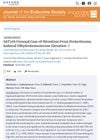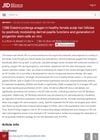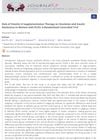 13 citations,
February 2020 in “Clinical, Cosmetic and Investigational Dermatology”
13 citations,
February 2020 in “Clinical, Cosmetic and Investigational Dermatology” Men with hair loss have higher BMI, waist size, blood pressure, and are linked to smoking and inactivity.
13 citations,
April 2002 in “International Journal of Toxicology” The safety of placental and umbilical extracts in cosmetics is uncertain, requiring more research.
4 citations,
December 2021 in “Journal of clinical laboratory analysis” A new mutation in the DCAF17 gene was found to cause Woodhouse-Sakati syndrome in a large family.
 4 citations,
November 2021 in “Cancers”
4 citations,
November 2021 in “Cancers” The document concludes that understanding and managing hair loss in cancer patients is important, and more research is needed for better treatments.
2 citations,
November 2016 in “Current sexual health reports” Over-the-counter products can help with menopause symptoms, but be aware of their ingredients.
 1 citations,
December 2021 in “Androgens”
1 citations,
December 2021 in “Androgens” Testosterone and its metabolites affect brain functions and could help treat neurological disorders.
 April 2024 in “Skin appendage disorders”
April 2024 in “Skin appendage disorders” Environmental pollutants can damage hair health and cause hair loss.
 February 2024 in “Biomedicines”
February 2024 in “Biomedicines” Hormones like androgens, estrogen, thyroid hormones, and stress hormones can contribute to hair loss, and treatments target these hormonal imbalances.
 January 2024 in “Endocrine and metabolic science”
January 2024 in “Endocrine and metabolic science” Different types of PCOS need specific diagnosis methods and treatments.
 August 2023 in “Medicina-lithuania”
August 2023 in “Medicina-lithuania” Abusing steroids can damage your heart, muscles, reproductive system, liver, skin, and brain, and may increase the risk of Alzheimer's disease.
 March 2012 in “Hair transplant forum international”
March 2012 in “Hair transplant forum international” Environmental factors and chemicals might affect hormone balance and contribute to common hair loss.
 5 citations,
May 2023 in “Science of the total environment”
5 citations,
May 2023 in “Science of the total environment” PFAS exposure in adolescence may delay puberty in females.
 1 citations,
February 2023 in “Drug Design Development and Therapy”
1 citations,
February 2023 in “Drug Design Development and Therapy” Plant adaptogens may help treat skin diseases and improve skin health, but more research is needed to fully understand how they work.
 1 citations,
September 2021 in “Skin appendage disorders”
1 citations,
September 2021 in “Skin appendage disorders” Botulinum toxin injections can help treat common hair loss in men, but more research is needed to confirm this and understand how it works.
 October 2023 in “Journal of the Endocrine Society”
October 2023 in “Journal of the Endocrine Society” A woman's excessive hair growth was linked to a rare case of high testosterone caused by a prolactin-producing pituitary tumor.
October 2021 in “Technology transfer: innovative solutions in medicine” The combined treatment improved scalp health in women with early-stage hair loss.
 April 2023 in “The journal of investigative dermatology/Journal of investigative dermatology”
April 2023 in “The journal of investigative dermatology/Journal of investigative dermatology” Estetrol may help prevent hair loss and promote hair growth in women.
 January 2021 in “Research Square (Research Square)”
January 2021 in “Research Square (Research Square)” 150 kHz electromagnetic radiation may improve polycystic ovary condition in rats.
 6 citations,
December 2022 in “Frontiers in Pharmacology”
6 citations,
December 2022 in “Frontiers in Pharmacology” Quercetin may help improve symptoms of polycystic ovary syndrome.
 2 citations,
May 2023 in “Current Nutrition Reports”
2 citations,
May 2023 in “Current Nutrition Reports” Eating a Mediterranean diet and taking certain supplements may improve symptoms of PCOS.
September 2021 in “Eureka: Health Sciences” Androgenetic alopecia in women may be improved by targeting oxidative stress, inflammation, and fibrosis.
15 citations,
August 2010 in “Fertility and sterility” Metformin works better for adolescent girls with PCOS who have certain genetic variations.

Male goat smell increases reaction in young female goats' noses but doesn't cause them to start puberty early.
 36 citations,
October 2021 in “Frontiers in Endocrinology”
36 citations,
October 2021 in “Frontiers in Endocrinology” Insulin resistance and high male hormone levels are major causes of Polycystic Ovary Syndrome.
29 citations,
July 2011 in “Pediatrics in review” Accurate assessment of puberty using Tanner staging is crucial for identifying normal and abnormal development.
11 citations,
November 2021 in “International journal of molecular sciences” Gut microbes significantly affect brain steroid levels.
 June 2023 in “Skin Research and Technology”
June 2023 in “Skin Research and Technology” High-resolution MRI can distinguish between tertiary androgenetic alopecia and severe alopecia areata by measuring scalp and tissue thickness and hair follicle depth.
 March 2019 in “Evidence Based Women Health Journal (Online)”
March 2019 in “Evidence Based Women Health Journal (Online)” Vitamin D supplements increased ovulation rates in women with PCOS who were vitamin D deficient.
88 citations,
August 2014 in “PLOS genetics” Syndecan-1 is essential for maintaining skin fat and preventing cold stress.
61 citations,
September 2010 in “Journal of Dermatological Science” Stress hormones and autoimmune reactions can cause hair loss.




















